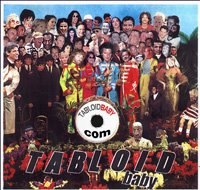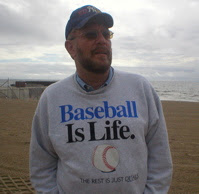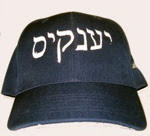
Yes, we went cold turkey on coverage of the scandal of the Israel Baseball League after a solid year of intense, exclusive, controversial and Pulitzer Prize-nominated reporting. And in light of that Pulitzer nod, we’ll be checking in occasionally with updates provided by the tenacious and world-beating reporter Elli Wohlgelernter—known here as Our Man Elli In Israel-- who carried this story singlehandedly and reported recently that there will be no professional baseball in Israel until 2010 at the earliest.
Our Man Elli’s reportage apparently stirred up a reaction from the Boston-based businessman who's now heading the putative league-- and apparently still drumming up money from American investors for the battered IBL. He sends along this latest, exclusive report:
It appears it ain’t over for the non-existent Israel Baseball League, which continues to squeeze the American Jewish community for money and solicit unsuspecting American Jews and Zionists for an Israeli baseball season that’s already been blocked by Israeli officials.

 I obtained an email sent by David Solomont, who took the reins of the IBL from embattled Boston bagel baron Larry Baras (and was immediately tagged with the sobriquet “El Presidente of the Dominican Republic of The Middle East Baseball League”) stating his intention to play professional baseball in "the summer of 2009 and have a winter season Nov to Jan 2009/2010”:
I obtained an email sent by David Solomont, who took the reins of the IBL from embattled Boston bagel baron Larry Baras (and was immediately tagged with the sobriquet “El Presidente of the Dominican Republic of The Middle East Baseball League”) stating his intention to play professional baseball in "the summer of 2009 and have a winter season Nov to Jan 2009/2010”:
From: David Solomont
To: ***** ****************
Cc: ****…
Sent: Tuesday, December 16, 2008 7:39:24 PM
Subject: Re: Baseball In Israel
Unfortunately, there is no baseball next week.
We expect to kick off the 2009 season in late June and play the summer of 2009 and have a winter season Nov to Jan 2009/2010.
David Solomont
(617) ***-****
As I reported on December 3rd, sources tell me that one thing is for sure: the Israel Association of Baseball, which governs the sport in the nation, will not negotiate with David Solomont.

The controversial Boston businessman and de facto head of the IBL is persona non grata, ever since he announced a twenty-game 2008 IBL season ... make that seven-game… er, six-game... would you believe a five-game "festivus" that never took place?
Even so, the front man for disgraced IBL founder and former president Larry Baras continues raising cash for a pro baseball league in Israel in 2009.
 Every source close to the Israel sports establishment tells me that Solomont may have a chance kicking off a 2009 season in Santo Domingo starring Chico Escuela, but has little chance of running a season in the Holy Land.
Every source close to the Israel sports establishment tells me that Solomont may have a chance kicking off a 2009 season in Santo Domingo starring Chico Escuela, but has little chance of running a season in the Holy Land.
There will be no sequel to the rousing documentary Holy Land Hardball, because the Israel Association of Baseball is not, and will not, negotiate any deal with the league that survived a single season in 2007.

Solomont is also urging potential investors to sign up on the IBL website for news. When we last looked, there hadn't been a new posting since the infamous July 24th, 2008 announcement that stated explicit plans for:
"…a week-long baseball festival starting on August 17th that will pit an IBL All-Star team against a team made up of premier Israeli players.
“Details of the baseball festival, which will run from August 17th through August 21st, will be announced on this site in the upcoming days.
“Players have already begun to arrive in Israel for the event, which will also feature clinics during the week in Hashmonaim and Bet Shemesh. Photograph sessions will be available before and after every game with your favorite IBL star. Tickets will be sold at the door with all proceeds to benefit JNF's Project Baseball."
As of today, December 20th, there is no update on the now-legendary Festivus.
And speaking of Larry Baras-- remember my report of December 3rd, I asked:
“Why is the JNF in bed with the IBL? “And how much money is stuffed inside the mattress of that bed?”
Now, it turns out they've pulled up the sheets to snuggle even closer:
Larry Baras is now on the board of the New England branch of the JNF.
Stay tuned…
(And catch up on all our coverage of the Israeli Baseball saga here, at our Baseball in Israel website.)
Our Man Elli’s reportage apparently stirred up a reaction from the Boston-based businessman who's now heading the putative league-- and apparently still drumming up money from American investors for the battered IBL. He sends along this latest, exclusive report:
It appears it ain’t over for the non-existent Israel Baseball League, which continues to squeeze the American Jewish community for money and solicit unsuspecting American Jews and Zionists for an Israeli baseball season that’s already been blocked by Israeli officials.

 I obtained an email sent by David Solomont, who took the reins of the IBL from embattled Boston bagel baron Larry Baras (and was immediately tagged with the sobriquet “El Presidente of the Dominican Republic of The Middle East Baseball League”) stating his intention to play professional baseball in "the summer of 2009 and have a winter season Nov to Jan 2009/2010”:
I obtained an email sent by David Solomont, who took the reins of the IBL from embattled Boston bagel baron Larry Baras (and was immediately tagged with the sobriquet “El Presidente of the Dominican Republic of The Middle East Baseball League”) stating his intention to play professional baseball in "the summer of 2009 and have a winter season Nov to Jan 2009/2010”:From: David Solomont
To: ***** ****************
Cc: ****…
Sent: Tuesday, December 16, 2008 7:39:24 PM
Subject: Re: Baseball In Israel
Unfortunately, there is no baseball next week.
We expect to kick off the 2009 season in late June and play the summer of 2009 and have a winter season Nov to Jan 2009/2010.
David Solomont
(617) ***-****
As I reported on December 3rd, sources tell me that one thing is for sure: the Israel Association of Baseball, which governs the sport in the nation, will not negotiate with David Solomont.

The controversial Boston businessman and de facto head of the IBL is persona non grata, ever since he announced a twenty-game 2008 IBL season ... make that seven-game… er, six-game... would you believe a five-game "festivus" that never took place?
Even so, the front man for disgraced IBL founder and former president Larry Baras continues raising cash for a pro baseball league in Israel in 2009.
 Every source close to the Israel sports establishment tells me that Solomont may have a chance kicking off a 2009 season in Santo Domingo starring Chico Escuela, but has little chance of running a season in the Holy Land.
Every source close to the Israel sports establishment tells me that Solomont may have a chance kicking off a 2009 season in Santo Domingo starring Chico Escuela, but has little chance of running a season in the Holy Land.There will be no sequel to the rousing documentary Holy Land Hardball, because the Israel Association of Baseball is not, and will not, negotiate any deal with the league that survived a single season in 2007.

Solomont is also urging potential investors to sign up on the IBL website for news. When we last looked, there hadn't been a new posting since the infamous July 24th, 2008 announcement that stated explicit plans for:
"…a week-long baseball festival starting on August 17th that will pit an IBL All-Star team against a team made up of premier Israeli players.
“Details of the baseball festival, which will run from August 17th through August 21st, will be announced on this site in the upcoming days.
“Players have already begun to arrive in Israel for the event, which will also feature clinics during the week in Hashmonaim and Bet Shemesh. Photograph sessions will be available before and after every game with your favorite IBL star. Tickets will be sold at the door with all proceeds to benefit JNF's Project Baseball."
As of today, December 20th, there is no update on the now-legendary Festivus.
And speaking of Larry Baras-- remember my report of December 3rd, I asked:
“Why is the JNF in bed with the IBL? “And how much money is stuffed inside the mattress of that bed?”
Now, it turns out they've pulled up the sheets to snuggle even closer:
Larry Baras is now on the board of the New England branch of the JNF.
Stay tuned…
(And catch up on all our coverage of the Israeli Baseball saga here, at our Baseball in Israel website.)










































